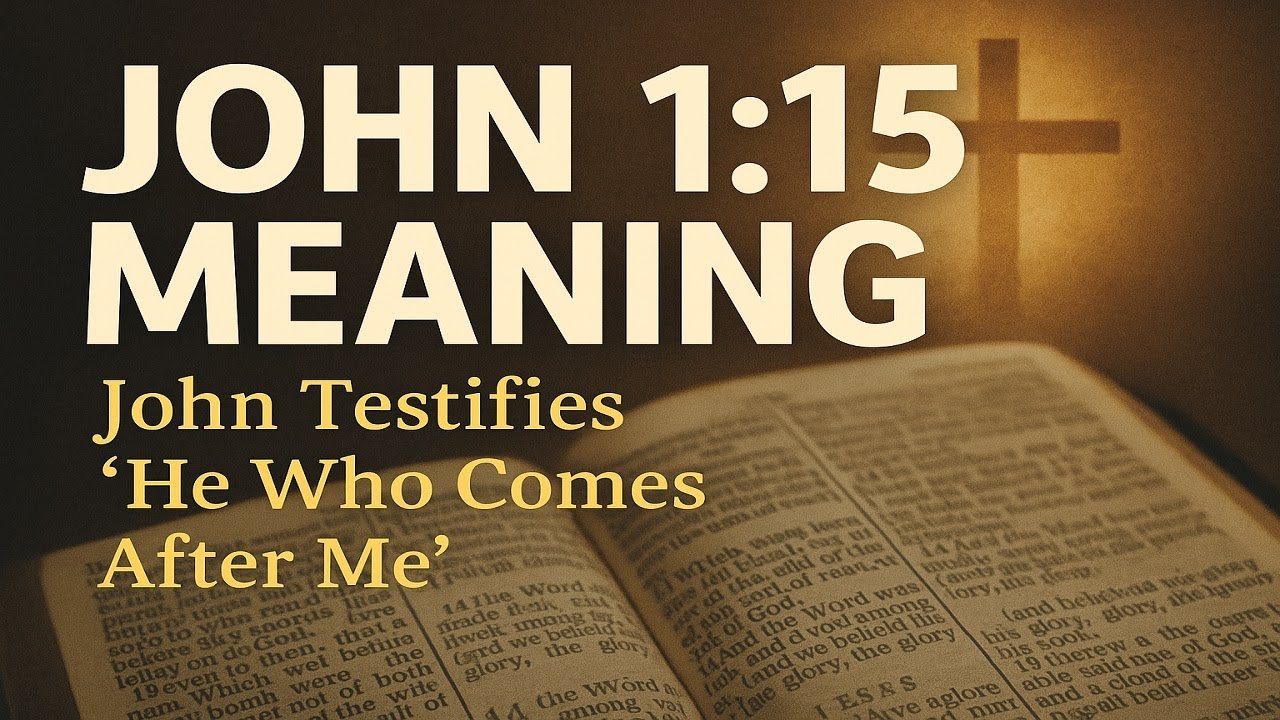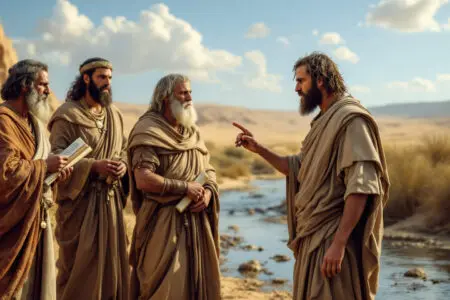It’s not something you see every day. True, genuine humility. I’m talking about the kind of profound self-awareness that allows a person in the spotlight to willingly turn that light onto someone else, even if it means they end up in the shadows. It’s a rare and powerful quality.
Out by the Jordan River, amidst the dust and the crowds, a man in camel’s hair was doing exactly that. John the Baptist was a superstar prophet, the man everyone flocked to see. But his entire mission, his whole identity, was wrapped up in pointing the way for another. This brings us to a single, powerhouse verse he shouted—a statement that seems to tie logic in a knot but actually unlocks everything about Jesus Christ. We’re looking at the John 1:15 meaning, and it’s a game-changer.
He cries out, “This was he of whom I said, ‘He who comes after me has surpassed me because he was before me.’” Read that again. It sounds like a riddle, doesn’t it? How can the person who comes after you have also existed before you? It’s this very paradox that cracks open one of the biggest truths in Christian faith. Let’s figure it out.
More in John Chapter 1 Category
Key Takeaways
- John’s Job Was Simple: He wasn’t building his own movement. His one and only goal was to be a credible witness who prepared the way for Jesus and pointed everyone directly to Him.
- Time vs. Status: “He who comes after me” is about timing. Jesus started His ministry after John and was younger. But “has surpassed me” is about status, declaring Jesus’ infinite superiority and rank.
- The Divinity Claim: The reason for this superiority is the bombshell: “for He was before me.” This isn’t a metaphor; it’s a direct statement that Jesus existed eternally, long before John was ever born.
- Setting the Gospel’s Theme: This verse is the opening argument for the entire Gospel of John. The rest of the book is dedicated to proving this very point: Jesus is eternal, divine, and supreme over all.
So, Who Was This John the Baptist, Really?
It’s easy to get lost in the wild-man caricature of John the Baptist—the guy eating locusts and honey out in the desert. But for the people living in Judea, he wasn’t some strange hermit. He was a force of nature.
John was a true prophet, picking up the mantle of giants like Elijah. He fulfilled ancient prophecies about the one who would prepare the way for the Messiah. His message was direct and hit hard: Repent. The kingdom of heaven is at hand. And people listened. They came from all over, from the cities and the countryside, to be baptized in the Jordan as a public sign of their turning back to God. For that moment in history, he was the center of Israel’s spiritual world.
He was the man of the hour.
But John knew something crucial. He knew he wasn’t the final destination. He was just the signpost on the road.
Why Was Being a “Witness” So Important to John?
The author of John’s Gospel repeatedly calls him a “witness.” That was his job description. His purpose was to testify—to provide a truthful, firsthand account of someone far greater. He made it crystal clear, saying things like, “I am not the Christ,” and that he came only to “bear witness of the Light.” There wasn’t an ounce of confusion in his mind about his role.
I’m a huge music fan, and this always makes me think of a concert I saw years ago. The opening band was this young group I’d never heard of, and they were electric. They had the crowd completely captivated. But the way their singer ended the set is what I’ll never forget. He didn’t just say goodnight. He spent two solid minutes talking up the headliner, explaining how their music had changed his life and that we were about to see something truly special.
That was John the Baptist. He was the ultimate opening act, and he played his part perfectly. Every word he spoke, every person he baptized, was designed to turn the crowd’s attention and build their anticipation for the one who was on His way.
What Did “He Who Comes After Me” Mean to His Listeners?
John’s big statement is built on a clever contrast, and the first part is easy enough to grasp. When he says, “He who comes after me,” he’s talking about a simple, chronological fact.
Was He Just Talking About the Timeline?
Yes, that’s the starting point. John’s ministry was a national phenomenon before most people had ever heard the name Jesus of Nazareth. Jesus literally stepped onto the public stage after John did. John was making the waves first. So, in the sequence of events, Jesus followed him. It’s a plain statement of fact.
But there’s more to it.
Does It Also Refer to Their Ages?
It certainly does. From the Gospel of Luke, we learn that John and Jesus were cousins, with John being about six months older. In that culture, as in many today, age often implied seniority. The older was generally considered the greater. So John is setting up a cultural expectation in the minds of his audience: the older man is here, and the younger man is coming later. This simple fact makes the second half of his statement land with even more force.
How Can the One Who Comes After Also Be Before?
Here we are. This is the heart of the verse, the paradox that holds the key. John says the one coming later “has surpassed me because he was before me.” The Greek word for “before me” here is protos. While it can mean first in line, its weight here is all about supreme rank and preeminence. John is making two staggering claims: one about rank and one about existence itself.
The “Before” of Supreme Rank
First things first, John is announcing Jesus’ superior rank. Imagine a newly commissioned lieutenant who has been stationed at a military base for a year. One day, a four-star general, a veteran of many campaigns, arrives for an inspection. The lieutenant was there first, but is there any question who is superior? The general who comes after is infinitely before in rank, authority, and honor.
I saw a version of this in my first corporate job. A senior manager, a guy who’d been there 20 years, knew everything. He was the veteran. Then the company hired a new VP from outside. She was much younger than him, and she came “after” him in terms of tenure. But nobody was confused about who was protos—first in rank. Her authority was on another plane entirely.
This is precisely what John is getting at. He’s essentially telling the crowd, “Don’t get tripped up by the timeline. The one who is coming is in a category all by Himself. His rank is supreme.”
The “Before” of Eternal Existence
John could have stopped there, and it would have been a remarkable display of humility. But he gives the reason for Jesus’ supremacy: “for He was before me.”
With that short phrase, the meaning explodes beyond rank and into reality. He’s no longer just talking about authority. He is talking about being. He is making a direct claim about Jesus’ eternal pre-existence. According to the faculty at Dallas Theological Seminary, this points directly to Christ’s divine nature.
This is a stunning claim. John, the older cousin, is stating that his younger cousin existed before he was born. In human terms, that’s impossible. It only makes sense if Jesus’ life didn’t start in that manger in Bethlehem.
This testimony circles right back to the opening lines of the gospel: “In the beginning was the Word, and the Word was with God, and the Word was God.” John the Baptist’s declaration is the first human voice in the narrative to confirm the book’s cosmic opening. He is testifying that Jesus isn’t just another prophet or a king. He is the eternal Word of God, who existed before anything and everything—including John.
Why Was This Testimony So Dangerous and Radical?
It’s easy for us to read these words two thousand years later and miss the shockwave they would have sent through the crowd that day.
How Would a First-Century Jewish Audience Hear This?
The Jewish people were desperately waiting for their Messiah. They were looking for a powerful king, a prophet, a rescuer. But John’s words painted a picture far grander than that. To claim a man—his own relative—existed before he did was to claim divinity. It placed Jesus on the same level as God Himself, which was dangerously close to blasphemy.
Beyond that, for a prophet as popular as John to essentially give his following away was career suicide. He had the nation’s attention. He could have built a massive movement around himself. Instead, he took all that fame, all that influence, and he pointed it away from himself and toward Jesus. It was an act of incredible humility.
How Does This Set Up the Rest of the Gospel?
This verse is the thesis statement for the entire book of John. The rest of the gospel is a carefully constructed argument designed to prove the divine identity of Jesus. John the Baptist is presented as the first and most crucial witness.
Everything that comes next—the miracles, the “I AM” statements, the teachings, the crucifixion, and the resurrection—serves to confirm what the Baptist declared right here at the start. That Jesus, the one who came after, was indeed protos: first in rank and first in existence. The eternal Son of God.
What Does John’s Example Mean for Us?
John’s testimony in this verse isn’t just a dusty piece of theological history. It’s a challenge. His life gives us a blueprint for what it means to live with real purpose. He knew his life wasn’t about building his own brand but about making Jesus famous. He had one job—point to Jesus—and he did it with a relentless focus that wasn’t swayed by popularity or threats.
His example makes me ask myself: Does my life point to something greater than myself? Do I live with the kind of humility that makes people curious, not about me, but about the hope I have?
The John 1:15 meaning is more than a brain-teaser. It’s the declaration that kicks off the most important story ever told. It’s the testimony of the ultimate opening act, a humble man who had the honor of pointing to the eternal King. He was the signpost, showing us the way to the one who is the destination: Jesus Christ.
FAQ – John 1:15 Meaning

What is the cultural significance of the phrase ‘He was before me’ in John 1:15?
The phrase signifies Jesus’ eternal existence and divine preexistence, emphasizing that His life and authority are not limited by human age or chronology, which would have been a radical claim for a first-century audience.
Why did John the Baptist refer to Jesus as someone who comes after him, yet surpasses him?
John referred to Jesus as someone who comes after him chronologically, but surpasses him in rank and authority, because Jesus existed before John and holds a divine, eternal position that surpasses all in authority.
What is the significance of John 1:15 in understanding Jesus’ divine nature?
John 1:15 highlights the divine nature of Jesus by emphasizing that He existed before John the Baptist, affirming His eternal existence and divine preeminence, which is central to Christian faith.






